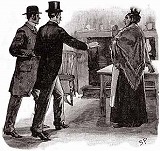“Then we returned to the office and searched the stairs and the passage without result. The corridor which led to the room was laid down with a kind of creamy linoleum which shows an impression very easily. We examined it very carefully, but found no outline of any footmark.”
“Had it been raining all evening?”
“Since about seven.”
“How is it, then, that the woman who came into the room about nine left no traces with her muddy boots?”
“I am glad you raised the point. It occurred to me at the time. The charwomen are in the habit of taking off their boots at the commissionaire’s office, and putting on list slippers.”
“That is very clear. There were no marks, then, though the night was a wet one? The chain of events is certainly one of extraordinary interest. What did you do next?”
“We examined the room also. There is no possibility of a secret door, and the windows are quite thirty feet from the ground. Both of them were fastened on the inside. The carpet prevents any possibility of a trapdoor, and the ceiling is of the ordinary whitewashed kind. I will pledge my life that whoever stole my papers could only have come through the door.”
“How about the fireplace?”
“They use none. There is a stove. The bell-rope hangs from the wire just to the right of my desk. Whoever rang it must have come right up to the desk to do it. But why should any criminal wish to ring the bell? It is a most insoluble mystery.”
“Certainly the incident was unusual. What were your next steps? You examined the room, I presume, to see if the intruder had left any traces -any cigar-end or dropped glove or hairpin or other trifle?”
“There was nothing of the sort.”
“No smell?”
“Well, we never thought of that.”
“Ah, a scent of tobacco would have been worth a great deal to us in such an investigation.”
“I never smoke myself, so I think I should have observed it if there had been any smell of tobacco. There was absolutely no clue of any kind. The only tangible fact was that the commissionaire’s wife - Mrs. Tangey was the name - had hurried out of the place. He could give no explanation save that it was about the time when the woman always went home. The policeman and I agreed that our best plan would be to seize the woman before she could get rid of the papers, presuming that she had them.
“The alarm had reached Scotland Yard by this time, and Mr. Forbes, the detective, came round at once and took up the case with a great deal of energy. We hired a hansom, and in half an hour we were at the address which had been given to us. A young woman opened the door, who proved to be Mrs. Tangey’s eldest daughter. Her mother had not come back yet, and we were shown into the front room to wait.
“About ten minutes later a knock came at the door, and here we made the one serious mistake for which I blame myself. Instead of opening the door ourselves, we allowed the girl to do so. We heard her say, ‘Mother, there are two men in the house waiting to see you,’ and an instant afterwards we heard the patter of feet rushing down the passage. Forbes flung open the door, and we both ran into the back room or kitchen, but the woman had got there before us. She stared at us with defiant eyes, and then, suddenly recognizing me, an expression of absolute astonishment came over her face.

“ ‘Why, if it isn’t Mr. Phelps, of the office!’ she cried.
“ ‘Come, come, who did you think we were when you ran away from us?’ asked my companion.
“ ‘I thought you were the brokers,’ said she, ‘we have had some trouble with a tradesman.’